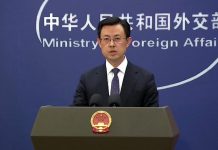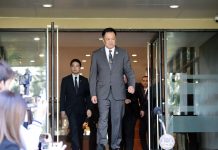Provinces nationwide are proceeding with the plan to create an atmosphere that is conducive to national reconciliation, in line with the instructions given by the National Council for Peace and Order (NCPO).
Permanent Secretary for Interior Wiboon Sanguanpong said that provincial governors, in their capacity as directors of the national reconciliation centers in their respective areas, have been assigned to arrange activities at the village level as part of the reconciliation efforts and to listen to the views of local people.
In the process, questionnaires are being distributed and are scheduled to be completed in July 2014, when the people’s views and suggestions on national reconciliation are compiled. Results will be submitted to the NCPO Head, General Prayut Chan-O-Cha.
Speaking on the establishment of the National Reconciliation Center, General Prayut explained that his primary objective is to give people an opportunity to talk to each other, after nine years of political rifts leading to establishment of different political and social factions. In the reconciliation process, the NCPO will act as an observer, a facilitator, and an information provider. It will collect ideas from all sides and use the information gathered in order to materialize the national reconciliation and reforms.
He said that the NCPO welcomes opinions from all sides, conflicting groups, and political parties, and that all the proposed issues would be discussed openly with little involvement of the military in this effort. The military will not judge what is right or wrong or force its view on the results.
After the reconciliation process, the NCPO will move to the second phase, which includes the forming of a government, a reform council, and a legislative council. All issues will be brought before the reform council. Issues agreed upon by all sides will be forwarded to the legislative council and go through the legislative process.
General Prayut stated that, on the road to the reconciliation, some activities will have to be carried out simultaneously, including recreational and entertainment programs, to equip people with the atmosphere conducive to reconciliation talks. In the second phase, everything will be resolved through the laws and the reform council.
He pointed out that the NCPO would do its best to prevent any conflict from recurring in the second phase. If conflicts are still unresolved, the reform council in the second phase will not be able to work. The direction in this phase will be based on ideas that are proposed by experts and scholars.
Meanwhile, the Reform Network, comprising 70 professionals and civil society organizations, suggested that there should be a group of people that can bring conflicting parties to the negotiating table. The group, which might be an organization, should be acceptable to all sides. People should also be assured that they would be part of the reconciliation process. In addition, there should be several forms of the national reconciliation process in accordance with different aspects of the Thai society.




